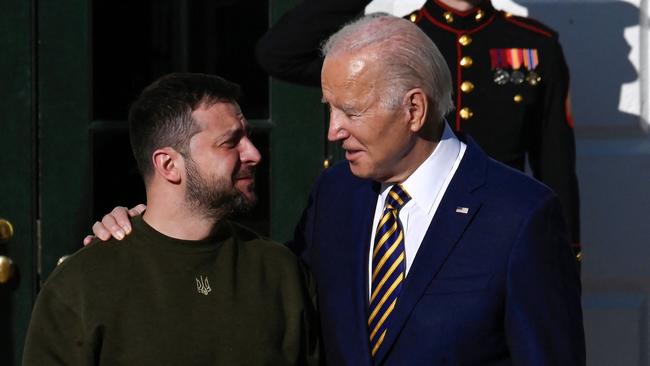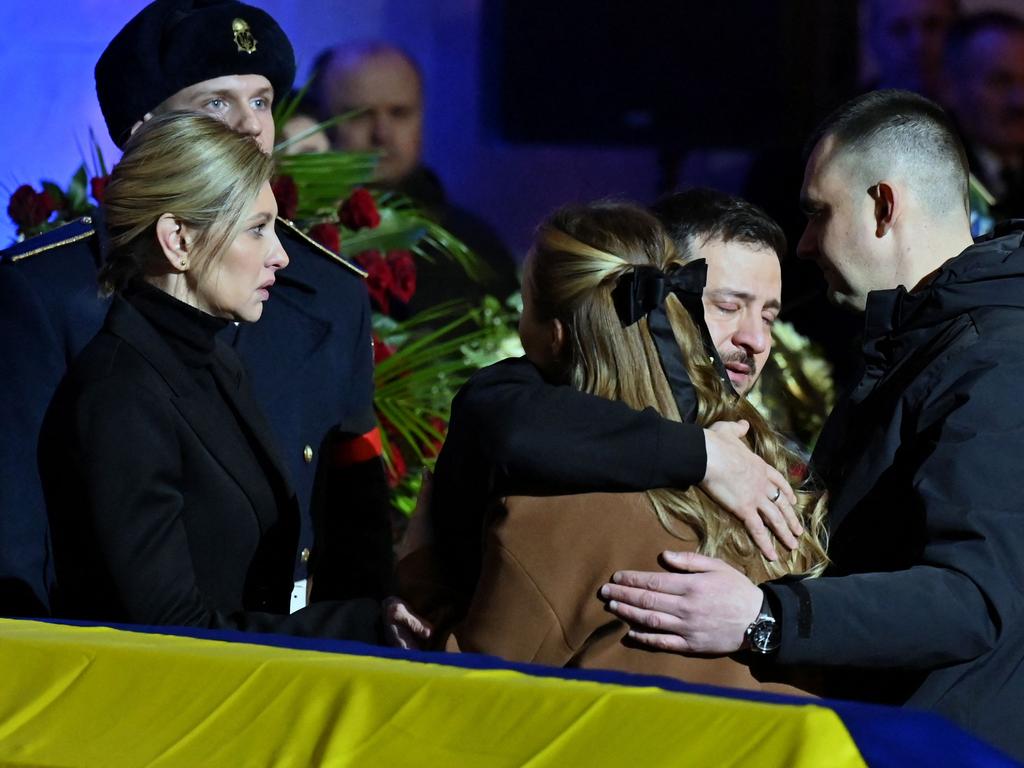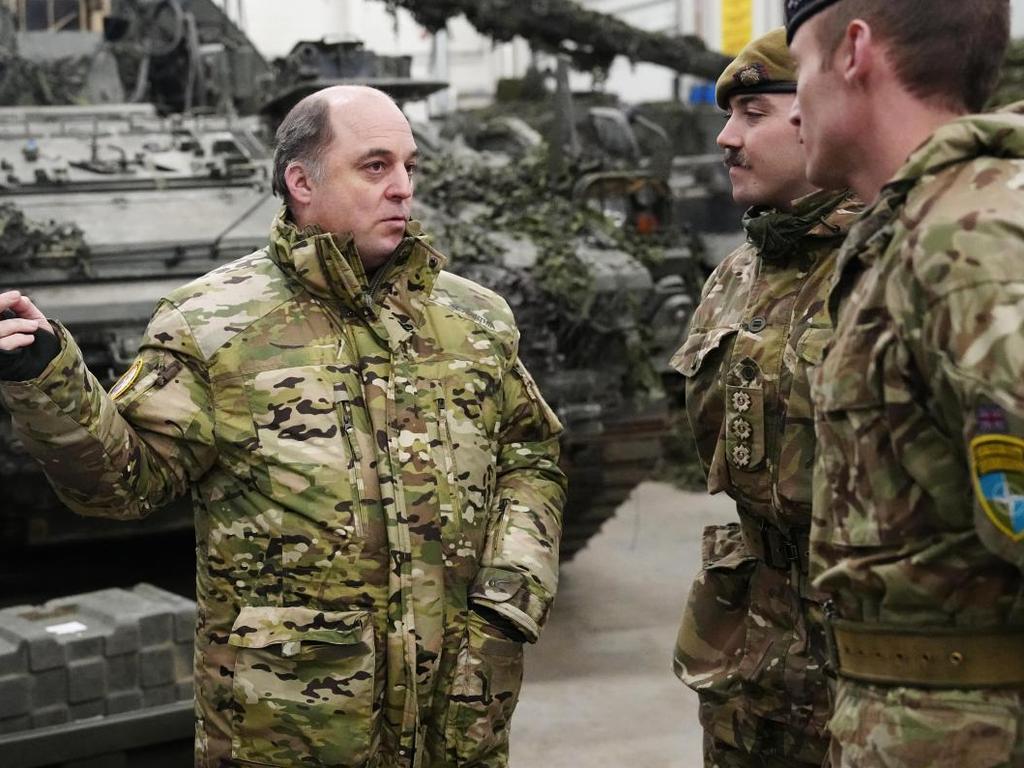Negotiated ‘peace’ better than endless carnage in Ukraine
The chairman of the US Joint Chiefs of Staff says there is a slim to zero chance Ukraine can successfully expel Russia from its country. It’s time to negotiate.
Milley was attacked for his supposedly defeatist attitude by the usual foreign policy grandees, but as the 12-month mark of the war looms, after tens of thousands of deaths on both sides, a reality check is more than welcome.
For almost a year we’ve read how Vladimir Putin is on the verge of death and Russia, enfeebled by Western sanctions, is about to collapse. None of this has happened, for all the billions spent and lives lost, and there’s precious little evidence it will.
The more likely, however unappealing, scenario is that Russia gets to keep the territory it controls, regardless of how long the conflict goes on.
However, the Ukrainian government insists it won’t negotiate until Russia has withdrawn fully, including from Crimea, which Moscow has controlled since 2014, a recipe for a never-ending war that could hobble the US’s ability to support Australia.
Only last week US Navy Secretary Carlos Del Toro remarked that US assistance to Ukraine would eventually undermine the US Navy, pockets of which might be looking for excuses down the line not to help other US allies.
“I wouldn’t say we’re quite there yet, but if the conflict does go on for another six months, for another year, it certainly continues to stress the supply chain in ways that are challenging,” he told journalists at a navy conference.

Former secretaries of state Condoleezza Rice and Robert Gates, in an oped for The Washington Post, made similar points a week earlier: unless NATO is willing to provide Ukraine with a “dramatic increase in military supplies and capability”, Russia would keep the territory it has.
“The Russian economy and people will suffer as the war continues, but Russians have endured far worse,” Rice and Gates wrote. “Count on Putin to be patient to achieve his destiny.”
Indeed, rumours of Putin suffering serious health problems have circulated for at least a year but he is probably more likely to die in a coup if he withdrew than from cancer, a powerful incentive for him to press on.
As for the Russian people, theirs is a culture and history of suffering, under the tsars, the Soviets, and now Putin, who even after 20 years at the helm enjoys vastly more popularity than any Western leader.
Ordinary Russians are more likely to embrace loss of personal liberty, denial of educational and economic opportunities, higher taxes and even conscription as a duty to the state than to agitate to remove their leader. Even Stalin, for all the chaos he wrought, was and is still revered.
And Putin’s generals and ministers, whatever their private misgivings, derive their power and wealth from Putin alone.
Indecision among NATO allies about whether to send tanks might reflect a dawning realisation that sending further material and money is delaying the inevitable, and could even inflame the situation.
Crowds gathered outside the German Bundestag over the weekend chanting “free the Leopards now”, a reference to Germany’s class of tank, and Kiev’s demands to have lots of them as soon as possible.
But can you imagine a better propaganda gift to Moscow than sending German tanks, which in World War II contributed to the deaths of more than 25 million Soviet soldiers and civilians, about three times Australia’s population at the time, to Ukraine. I would hazard a guess Russians learn at school about the role of German tanks in WWII.
The fact a year of Russian atrocities hasn’t moved other powerful governments to help Ukraine suggests they don’t expect Russia to withdraw and Putin’s regime to collapse. China and India, two giants, remain either allies or friends. Turkey, controlling the entrance to the Black Sea, has begun actively defying Western sanctions on Russia.
The new President of Brazil, Lula da Silva, feted in elite circles as bringing an end to the corruption of the Bolsonaro era, criticised NATO last May. “It’s not just Putin who is guilty,” he told Time magazine. “The US and the EU are also guilty. What was the reason for the Ukraine invasion? NATO? Then the US and Europe should have said: ‘Ukraine won’t join NATO’. That would have solved the problem.”
Saudi Arabia, Mexico, Indonesia and pretty much all of Africa have resisted active sanction of Moscow. They can’t all be immoral idiots, seduced by Russian bots. The most common argument for escalation is that Putin intends to attack NATO – Poland, Moldova or Finland perhaps – if he achieves anything at all in Ukraine. Given his forces couldn’t even overwhelm Ukraine, that seems unlikely.
If Germany and France, the biggest Western military powers on the continent, really believed Russia was poised to attack Europe, they might be doing a lot more than palming off the decisions and costs to US taxpayers, who have already racked up a $US100bn bill.
However much we think Putin’s invasion of Ukraine is evil or stupid, no amount of banning Russian flags or cancelling Swan Lake will reverse it. If the price to end the relentless carnage and destruction of a beautiful country is that the Dnipro River becomes the eastern border of a shrunken Ukraine, perhaps that’s a price worth paying.
At least ordinary Ukrainians in the Donbas and Crimea would then have the opportunity to emigrate safely to a better life offered in the Western part of the country.
Those who disagree strongly, as many do on social media, should be invited to go and help the fight personally.








General Mark Milley, chairman of the US Joint Chiefs of Staff, delivered an uncomfortable assessment last week of Ukraine’s chances of ejecting Russia: slim to zero. “From a military standpoint, I still maintain that for this year it would be very, very difficult to militarily eject the Russian forces from every inch of Ukraine … That doesn’t mean it can’t happen; doesn’t mean it won’t happen, but it’d be very, very difficult,” he said, adding the war “is likely to end in a negotiation”.